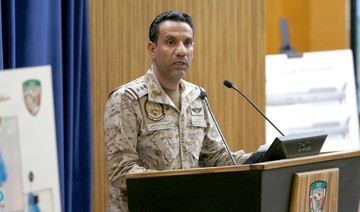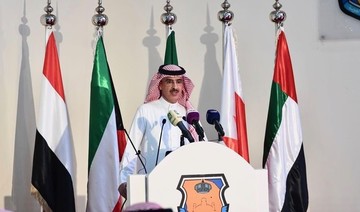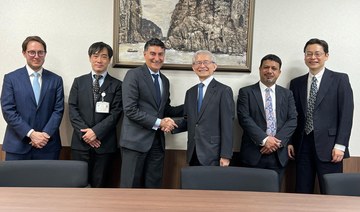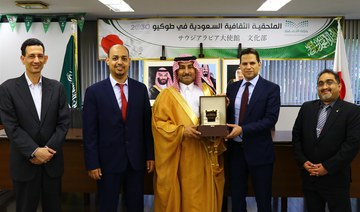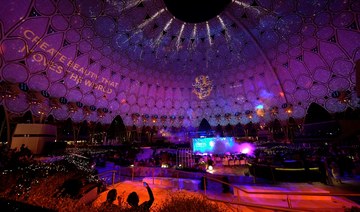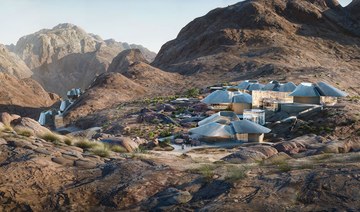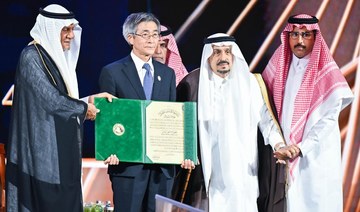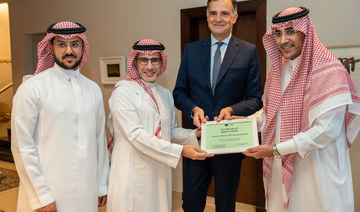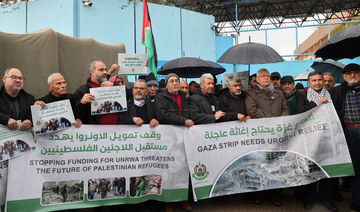RIYADH: The spokesman of the Joint Incidents Assessment Team (JIAT) in Yemen, legal consultant Mansour Bin Ahmed Al-Mansour, stressed that the team abides by transparency in announcing the results of engagement in Yemen.
This came in a news conference Al-Mansour held on Tuesday at King Salman Air Base in Riyadh for assessing several incidents. JIAT found that the Coalition Forces were not responsible for the incidents reported.
Al-Mansour reviewed several cases. They included the civilian fishing boat incident along the Yemeni coast in the Red Sea. which according to the Red Cross took place on Feb. 22, 2017. The Red Cross said the Coalition carried out attacks on civilians’ fishing boats along the Yemeni coast in the Red Sea, where two helicopters intercepted two fishing boats two nautical miles from Yakhtul coast. One of the helicopters targeted one of the boats, causing one death and two injuries.
However, JIAT investigations revealed that the Coalition Forces did not conduct any mission there on that date. Therefore, the Coalition Forces did not target the two fishing boats on the Yemeni coast.
The JIAT also investigated an incident in which the Coalition Air Forces on July 7, 2015 targeted Alwaht Mosque in Lahj Governorate, causing the deaths of 10 people and injured 15 others, according to the High Commissioner for Human Rights. In this instance the JIAT found that the closest target was 7km south of the Alwaht Mosque, which is north of Alwaht city.
The Coalition Air Forces carried out an air mission on a legitimate military target connected with the Houthi-armed militia, 300m away from the claimed location. After reviewing the satellite images of the coordinate given by the HCHR, it shows a destroyed building before April 15, 2015 — almost two months before the claimed date.
On investigating, JIAT found out that the Coalition Forces did not target Alwaht Mosque and that the procedures of the Coalition were carried out in accordance with the international humanitarian law and its customary rules.
Human Rights Watch also stated that the Coalition Forces at 10:50 p.m. on May 5, 2015 dropped three bombs on the Cultural Center and a vicinity house in Sa’dah, killing 28 people and injuring three others. Twenty-seven of these people were from one family. JIAT verified the incident, examined all related documents, and found that the Cultural Center was used for Maseerh FM to broadcast military news of the Houthi-armed militia in addition to broadcasting radio interviews with the Houthi leaders.
Based on that, the Cultural Center lost the legal protection of civilians because of the use of military actions and it was considered a legitimate military target.
Regarding the report issued by the Human Rights Watch in relation to the houses in Yarim, Ibb Directorate, which stated that an airstrike at 2 a.m. on July 19, 2015 caused the death of at least 16 civilians and injured 16 others in Yarim town, 120km from South Sana’a.
JIAT verified the incident, examined all related documents and assessed all gathered evidence. JIAT found that the Coalition Forces did not conduct any air missions on the day of the claim in Yarim town.
Human Rights Watch also stated that the Coalition Air Forces at 4:15 p.m. on May 12, 2015 targeted SHajjea Market with no fewer than five bombs, causing the death of 60 civilians and injuring at least 155 others.
JIAT found that there were no air missions throughout the governorate of Alhudeidah on the day claimed May 12, 2015, nor on the previous or following days. In light of that, JIAT found that the Coalition Air Forces did not target SHajjea Market in Zabid town.
Al-Mansour also announced the findings of investigations into what was broadcast in the media and the statement of the United Nations High Commissioner for Human Rights, that the Coalition Forces carried out an airstrike on a wedding in Bani Qais Directorate, Hajjah governorate on April 22, 2018. Initial investigations indicated that the two airstrikes killed at least 19 civilians, and 50 others were injured, most of them children. Also the airstrikes destroyed a wedding tent in a civilian house while the victims were celebrating a wedding.
Intelligence reports from Yemen indicated the presence of foreign ballistic missile experts, one a known Houthi leader, in a specific location in Hajjah governorate, which confirmed the previous information of the Coalition Forces about the arrival of foreign ballistic missile experts in Yemen through Alhudaydah port. Furthermore, seven ballistic missiles fired on Saudi Arabia were executed from Hajjah governorate.
JIAT reviewed the video recordings of the executed mission and could not verify the presence of a wedding tent in the targeted area. Also there were no indications of any ceremony gatherings in the targeted location.
JIAT also found that some of the rules of engagement were not followed to minimize collateral damages to the claimed tent as a result of targeting the building. JIAT recommends legal procedures should be taken against those responsible, and provides assistance for the damage and losses resulting from this mission.
A report from the International Committee of the Red Cross (ICRC) stated that there were two airstrikes on Sa’ada at 11:50 a.m. on April 9, 2018. One hit a welding workshop on Bin Salman road and the other hit the Higher Institute of Medical Science in Al Salam Hospital complex, causing the death of three civilians and injuring 19 others, some of them children.
In light of that, JIAT found that the ICRC report was not correct about the two airstrikes on the welding workshop and the Higher Institute of Medical Science, and that the procedures of the Coalition Forces in targeting the legitimate military target were carried out in accordance with international humanitarian law and its customary rules. JIAT also recommended that voluntary assistance be provided for the loss of the welding workshop.
Al-Mansour pointed out that the JIAT reports on realistic, clear and documented evidence, not on what is published in the social media, and that the Group formed a single system for the protection of human rights and the reduction of violations associated with military operations.
Fact-finding team presents results of 7 incidents in Yemeni conflict
Fact-finding team presents results of 7 incidents in Yemeni conflict
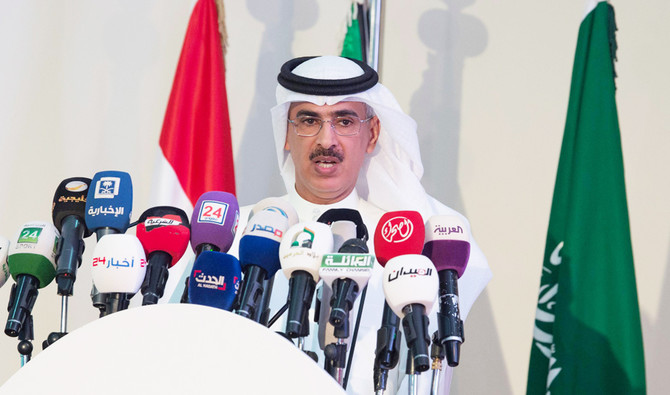
- JIAT joins organizations rejecting violations that happen during the military operations: Al-Mansour
- JIAT is independent and impartial: Al-Mansour
Japan, Saudi Arabia invite public to design 70th anniversary celebratory logo
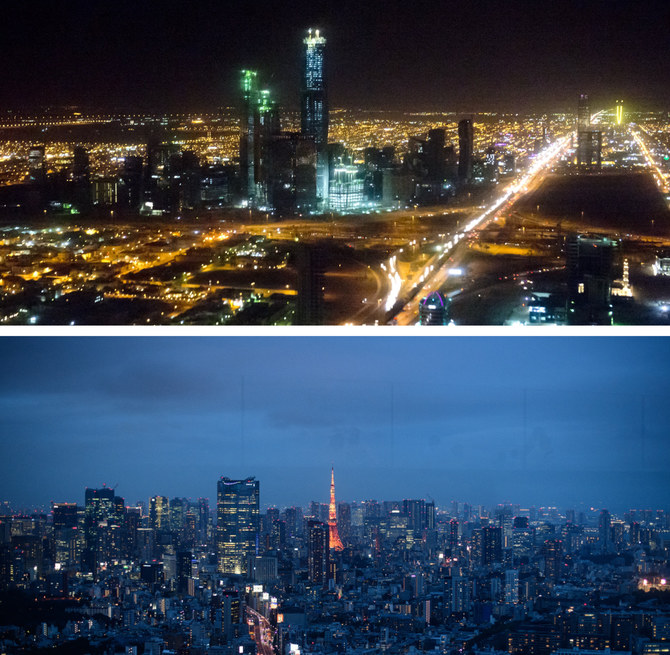
- The chosen logo will be used in all events commemorating the 70th anniversary of the two countries
- Anyone is eligible to apply to create a logo that conveys the strong ties between the Kingdom and Japan
The Japanese Ministry of Foreign Affairs has called for applications to design a logo to mark the 70th anniversary of the establishment of diplomatic relations between Japan and Saudi Arabia in 2025.
The chosen logo will be used in all events commemorating the 70th anniversary of the two countries.
Anyone is eligible to apply to create a logo that conveys the strong ties between the Kingdom and Japan.
The Ministry of Foreign Affairs of Japan, the Japanese embassy in Saudi Arabia, the Japanese consulate-general in Jeddah and the Saudi government will announce the best logo design on their websites and social media accounts.
The deadline for applications is June 10. Applications must be submitted as an email to [email protected].
Each logo design must be no larger than 3 MB in electronic format, with a resolution of 300 dpi or higher, in a file format — JPEG or PDF — that will fit an A4 size when printed.
An explanation of the purpose of the proposed logo mark is required with each submission.
A similar application was announced in 2021, when the UAE and Japan commemorated the 50th anniversary of establishing their diplomatic relationship.
More information on the applications can be found here: The 70th anniversary of the establishment of diplomatic relations between Japan and the Kingdom of Saudi Arabia in 2025 call for designs of the commemorative logo
Saudi Arabia, Japan officials discuss investment ties
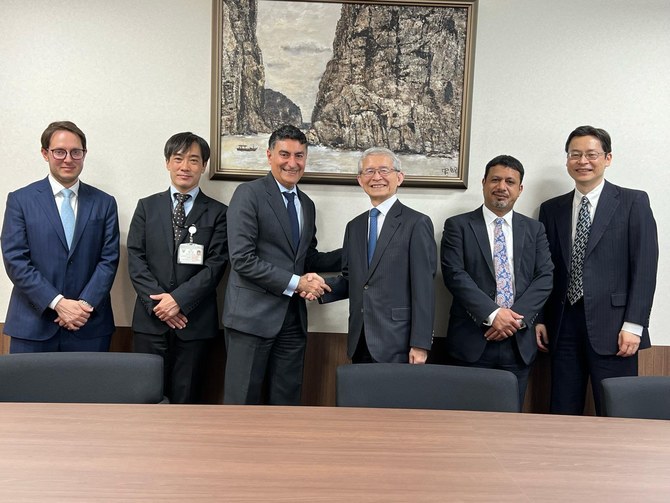
DUBAI: Saudi Arabia’s Ambassador to Japan Dr. Ghazi Binzagr met with Nobuyori Kodaira, chairman of the Japan Cooperation Center for the Middle East, on Thursday in Tokyo to discuss improving mutual investments.
The two officials highlighted the role that the JCCME plays in supporting Japan’s investments in Saudi Arabia, in sectors including healthcare, industry and entertainment.
The JCCME set up its regional headquarters in Riyadh in the 1990s. It now has an office in Dammam with an investment desk, while a water desk has been opened in Jeddah.
In 2018, the JCCME set up an investment-promotion scheme to fulfil the aims of the Saudi-Japan Vision 2030, within the framework of the Saudi Vision 2030 plan.
L’Oréal Middle East launches women upskilling project in Saudi Arabia
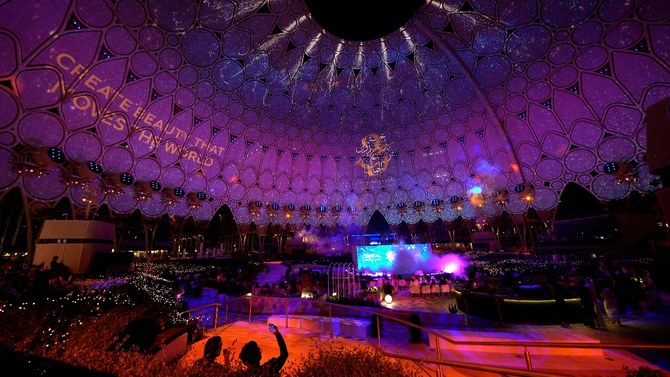
- L’Oreal Middle East inks pact with Kingdom’s Himayah Organization
- The initiative aims to help 600 women prepare for the workplace
DUBAI: As it celebrates its 25th anniversary, L’Oreal Middle East has signed an agreement with the Himayah Organization in Saudi Arabia to support its “Safe Homes” initiative, which seeks to provide skills training for more than 600 women.
“The project aims to have a lasting long-term impact through psychological support and skill training,” said Laurent Duffier, CEO of L’Oreal Middle East, in an interview with Arab News en Francais.
Over the past 25 years, L’Oreal has assisted 25,000 women in the region.
L’Oreal launched its Hairdressing Academy in Riyadh and Dammam in 2023, to upskill and integrate women in the workforce, recording a 70 percent employment rate in this growing beauty segment in Saudi Arabia. The program is expected to create 15,000 jobs for Saudi women.
The flagship “L’Oreal for Women in Science” program invested over $925,000 in endowments to support 51 female Arab scientists over the past decade and advocate for gender equality in STEM, or science, technology, engineering and mathematics.
In addition, the firm’s “Stand Up Against Street Harassment” project trained more than 11,000 participants on countering gender-based violence.

While the brand’s products have been distributed in the region since the 1960s, L’Oreal opened its first subsidiary in the Middle East in 1998, and currently serves 10 markets.
Today, the group is moving toward its 2030 sustainability, innovation and technology goals by engaging stakeholders across the supply chain, including consumers and startups, through strategic partnerships.
L’Oreal aims to foster innovation by investing in the startup ecosystem, the latest being the partnership with Astrolabs that launched the “L’Oreal Tech Quest Challenge” earlier in April 2024.
“The future is for beauty tech, tackling current industry challenges and augmenting the impact of L’Oreal’s solutions. ‘L’Oreal Tech Quest Challenge’ awarded a group of winners whose work will be incorporated in developing tools and best practices across the SAPMENA (South Asia Pacific - Middle East - North Africa) region,” said Duffier.
The region is home to a growing startup ecosystem. “LEAP in Saudi Arabia held in March reflects the growing entrepreneurial and creative energy in the Kingdom,” he added.
This is particularly important in the Middle East, where the beauty industry is recording one of the highest growth rates globally.
The GCC market ranks among the top 10 beauty markets worldwide, valued at $11.7 billion in 2024. Since the COVID-19 pandemic, the market has grown by 10 percent, fueled by underlying macroeconomic trends.
“Non-oil GDP in the GCC is growing at 4 to 5 percent while growing at less than 1 percent in Europe. The inflow of high-net-worth individuals had a positive impact on the luxury market in the UAE. While demand for beauty, particularly in Saudi Arabia, tripled during the last three years with the rise in women’s access to the workforce, and increase in disposable income,” said Duffier.
“The quality of retail execution, and the growth of new beauty concepts in the Kingdom, are factors boosting the market in the region, further enhanced by the growth in e-commerce,” he added.
According to a Boston Consulting Group report, in 2020 the Kingdom’s e-commerce share of total retail was 6 percent. This was far behind mature e-commerce markets and the worldwide average of 18 percent, but was 60 percent higher than the Kingdom’s 2019 share. It has been forecast that there will be double-digit growth post-COVID-19, with market value expected to exceed $13.3 billion by 2025.
“Saudi Arabia displays accelerated growth across segments. Efforts to diversify the economy are clear. It is the biggest economy in the region, with the highest potential, and it is a priority market for L’Oreal,” said Duffier.
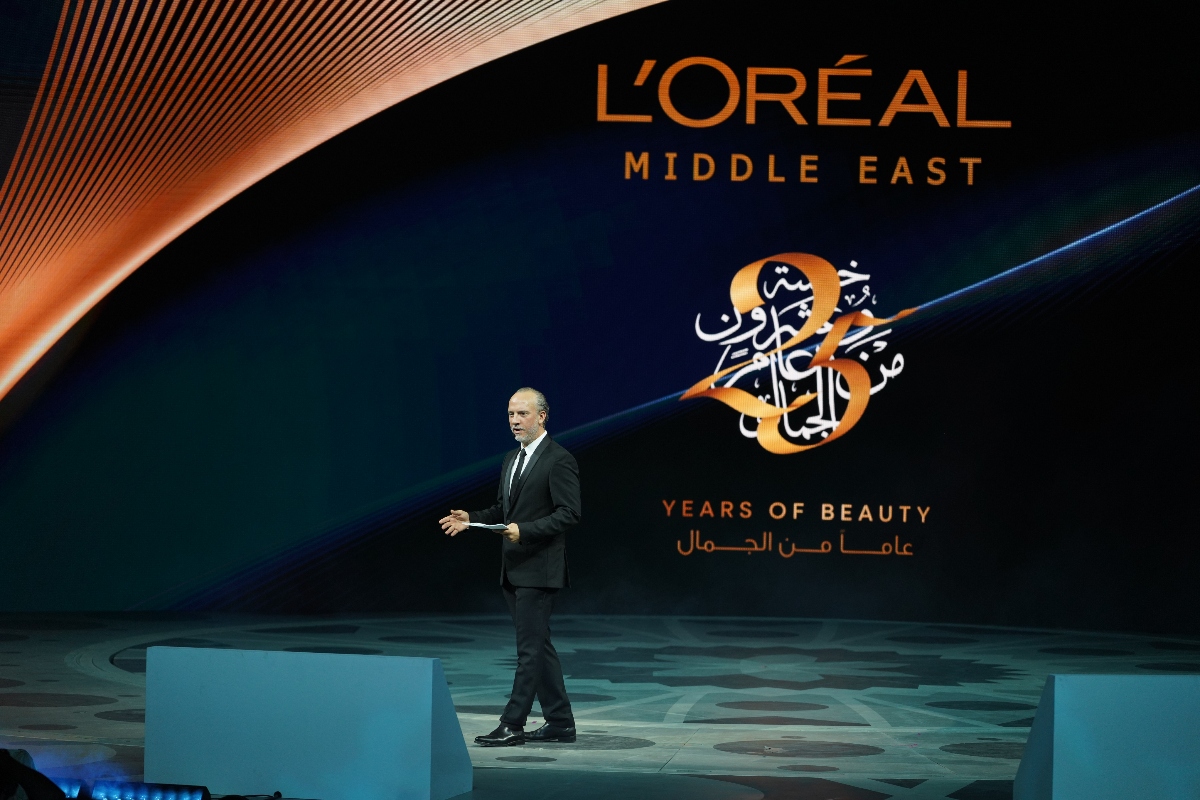
The offer-driven beauty and personal care market is expected to continue to be led by product innovation and beauty technology, for better end-user results, he said.
“We are launching Melasyl, after 18 years of R&D. A breakthrough ingredient for skin care treatments, among other applications,” said Duffier.
With lipstick used 5,000 years ago in Mesopotamia, Duffier describes the Middle East as the “cradle of beauty and a region that defines beauty trends.” The region has a diverse customer base, covering the full spectrum of skin and hair colors, is shifting toward digital platforms, and more sustainable consumption.
“We are working with startups to offer sustainable innovative products, with 70 percent of consumers opting for sustainable products,” said Duffier.
“We are no longer a beauty company, but a beauty tech company. Anchored in innovation and sustainability, the objective remains beauty for all. The future of beauty will be increasingly personalized to create beauty that moves the world, and most importantly to create beauty that moves the Middle East,” he said.
The quest for sustainability is also a byproduct of the reconciliation between beauty and tech, developed and implemented across the various segments: hair care (Airlight pro), derma cosmetics, the latest being La Roche-Posay’s diagnostic virtual reality tools, and make-up applications in collaboration with Microsoft.
“By applying green science, 95 percent of products’ ingredients will be bio-based and traceable to natural green-science formulations by 2030,” he said.
Advancing toward its sustainability targets, the “L’Oreal for the Future” program aims to reduce carbon dioxide emissions at all sites, and move to renewables, waste management and water treatment by 2030.
L’Oreal Middle East expects a 50 percent reduction in distribution-related carbon dioxide emissions, and a 70 percent reduction in water consumption with the introduction of Gjosa shower heads in hair salons.
Set to launch in the region this year, the latter is expected to target 500 salons per year, for a total yearly saving of 35 million gallons of water.
This is in addition to the recycling of 340 tonnes of waste over the past two years in Saudi Arabia, which is a Garnier initiative in collaboration with Panda and Naqaa Solutions.
Saudi cultural attache in Japan receives Jeddah University delegation
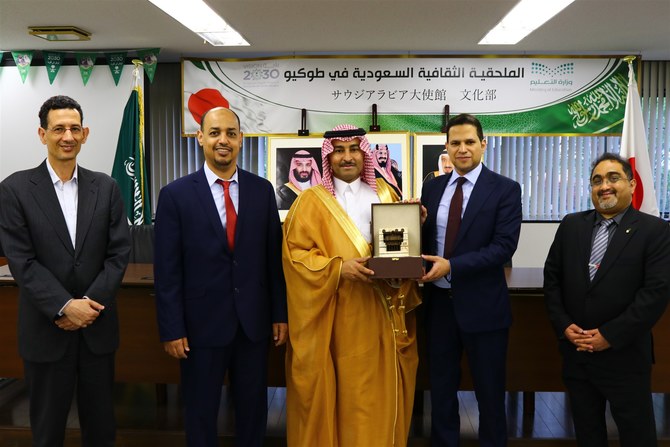
DUBAI: Saudi Arabia’s cultural attache in Japan hosted on Thursday a delegation from Jeddah University, led by the institution’s Vice President for Academic Affairs and Development Dr. Monagi bin Hassan Al-Kanaani.
Dr. Anas Ahmed, Jeddah University’s dean of the College of Engineering, and Dr. Mohammed Kalkatawi, director of the Data Management Office at the institution, were part of the delegation.
زار الملحقية الثقافية السعودية في #اليابان وفداً من #جامعة_جدة يرأسهم سعادة د. مناجي بن حسن الكناني وكيل الجامعة للشؤون الأكاديمية والتطوير ويرافقه سعادة د. أنس أحمد عميد كلية الهندسة و د. محمد كلكتاوي مدير مكتب إدارة البيانات بالجامعة خلال زيارتهم لليابان. pic.twitter.com/Cw72aLimXL
— الملحقية الثقافية السعودية في اليابان (@SaudiCultureJP) April 25, 2024
Badr Al-Otaibi, director of the office of the Saudi Arabia cultural attache in Japan, received the delegation.
The officials discussed their visits to several Japanese universities to explore cooperation opportunities and sign student-exchange agreements.
Saudi Arabia welcomes independent committee’s report on UNRWA’s performance
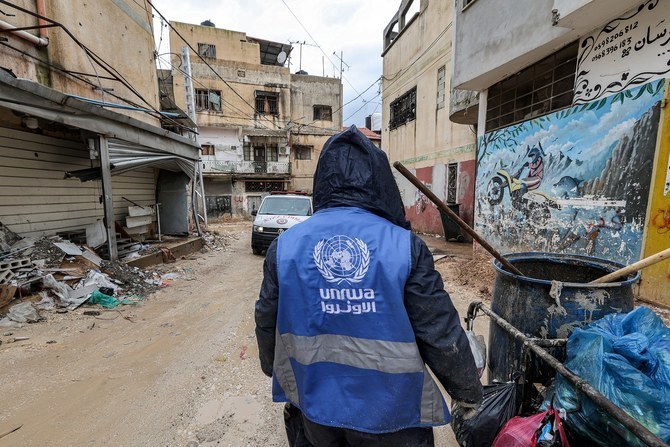
- Saudi Ministry of Foreign Affairs stresses importance of the commitment of donor countries to the organization
RIYADH: Saudi Arabia has welcomed an independent committee’s report on the performance of the UN Relief and Works Agency for Palestine Refugees, the Saudi Press Agency reported on Wednesday.
The Saudi Ministry of Foreign Affairs said the Kingdom backed the report, which confirmed UNRWA’s main role in supporting the relief, humanitarian and developmental efforts of the Palestinian people.
The ministry further reiterated Saudi Arabia’s emphasis on the importance of the commitment of donor countries to UNRWA to ensure the sustainability and effectiveness of all forms of support for refugees in a way that reduces their suffering, especially in light of the Israeli occupation’s continued violations of international law and international humanitarian law.


